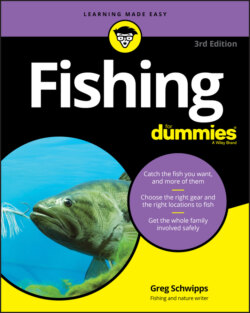Читать книгу Fishing For Dummies - Greg Schwipps - Страница 72
Where NOT to fish
ОглавлениеIf you’re fishing in public water, you’re paying for the privilege by purchasing a fishing license. If you’re fishing in privately owned water, you don’t need a license, but you do need permission, another form of a license. Another option, and one I hope you do not consider, is a paypond or paylake. These bodies of water are privately owned, and as such, they don’t require licenses to fish. Instead, the owner of the paypond will charge you a fee to fish for a set amount of time. So what’s wrong with payponds? Fish in payponds come from somewhere, and these fish (especially the big catfish) are netted from public waters (usually big rivers) by commercial fishermen. These catfish (often trophy size) are then hauled to payponds, where they swim in small, unnatural environments until they die. (At which point, the paypond owner replenishes the stock with more wild-caught fish!)
A paypond stocking only farm-raised channel catfish could be a legitimate option for you, but any paypond that will not verify where its fish come from should be ignored. (And no, those large blue or flathead catfish were not farm-raised.) Or paypond could be stocked with hatchery trout who, as a rule, are kind of stupid and don’t put up a great fight.
